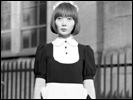Air Doll
- Year
- 2009
- Original title
- Kuki Ningyo
- Japanese title
- 空気人形
- Director
- Cast
- Running time
- 126 minutes
- Published
- 13 July 2009



by Tom Mes
For the past few years, Hirokazu Koreeda seems to be consciously trying to move toward a more commercial form of filmmaking, or at least toward making films capable of reaching audiences (particularly homegrown audiences) wider than festival and arthouse crowds. His pacifist samurai film Hana (Hanayori mo Naho, 2007), which starred multi-media idol and cover boy Junichi Okada, was a very clear attempt in that direction and saw the filmmaker promptly snubbed by the major festivals that normally vie for his presence. A planned biopic of perennially popular actress Yoshiko Yamaguchi / Ri Koran seems to have fallen through, but even with the seeming return to his Ozu-inspired arthouse roots that was Still Walking, Koreeda sought to reach a mainstream audience by casting the ubiquitous handsome romantic lead Hiroshi Abe as the father of the family.
While the artistic success of these ventures may be a matter of debate, there is little doubt that Koreeda's latest effort Air Doll is both his most commercial film and one of his most accomplished. Beginning life as a work-for-hire adapted from a short manga by Yoshiie Gouda, Air Doll is the story of an inflatable sex doll that gains life and goes in search of what it means to be human. Straying from the cramped, rickety house of her owner, lonely mama's boy Hideo (Itao), the doll goes out on daily treks around the neighbourhood, befriending a variety of individuals, taking a job at a video store and even starting a relationship with her mild-mannered co-worker (Arata).
Just as the titular doll escapes the confines of her existence, so does the film grow well beyond its modest origins. Koreeda's adaptation of the source material - he also wrote the screenplay - is according to all accounts a very liberal one, retaining from the manga only the basic idea of the doll coming to life and going his own way from there. Conversely, the source material also pushes the director into areas he may not have explored otherwise. One example of this is the choice of cinematographer Mark Lee (In the Mood for Love), whose elegant and languid tracking shots are decidedly un-Koreeda-like but give Air Doll a visual splendor rarely found in Japanese films these days (cinematography remains one of current Japanese cinema's weak points).
Though the most immediate reference for Air Doll's search for the true meaning of humanity would be Pinocchio, the central theme is one recurrent in Japanese literature, Frankensteinian though it may be. Ian Buruma devoted an entire chapter of his best-known collection of essays, A Japanese Mirror (a.k.a. Behind the Mask), to "The Human Work of Art", in which he makes ample reference to the work of literary great Junichiro Tanizaki. Tanizaki's first published work The Tattooist (Shisei, 1910) deals with the transformation of an innocent maiden into a man-eating femme fatale through the manipulation of her body - in this case a tattoo of a spider that covers her entire back. Air Doll more closely resembles another such story of Tanizaki's, the novel Naomi (Chijin no Ai, 1924), in which a shy, unmarried engineer's attempts to groom a teenage girl into an ideal Western-style lady see her transforming instead into a loosely moraled, manipulative wench with a string of boyfriends.
Both these classics were adapted for the screen by Yasuzo Masumura, the former (Spider Tattoo / Irezumi, 1966) starring Ayako Wakao and the latter (A Fool's Love / Chijin no Ai, 1966) starring Michiyo Okusu. Air Doll lacks the dark side that characterises so many of Masumura's protagonists, presenting the living doll as an ingenue and most of the flaws in the people around her as symptoms of a sick society: a lonely old man, a beauty-obsessed middle-aged woman, a shy nerd, and a bulimic shut-in. Koreeda sets the story in one of Tokyo's remaining shitamachi, an old neighbourhood of little independent houses, while ominous high-rises wait on the other side of the river for the aging abodes to crumble, impatient to take over the turf.
The presence of this social context and the striking use of Tokyo's cityscapes certainly confirms that Air Doll is well and truly a Koreeda film, one closely related to his most celebrated work Nobody Knows. Still, it is his most playful film yet, perhaps even his most optimistic, though balanced by a tragic undercurrent.
But to return to Masumura, Air Doll is also Koreeda's most overtly erotic creation. Its sexual nature is inherent in the premise and although sexuality is hardly characteristic of the director's work, there are thankfully no signs of prudishness in Air Doll. This is truly a film about an inflatable sex doll, with all the situations this entails. Even after she has been given the gift of life, the doll continues to believe that her function is to give sexual pleasure, and thanks to the very short skirt of the maid's uniform she wears on her outings, the men around her seem to agree.
This is one reason why the casting of Bae Doona is a masterstroke. Certainly not a classical screen beauty, the Korean actress nevertheless displayed a singular sort of sex appeal in a number of her earlier roles, most notably in Park Chan-wook's Sympathy for Mr. Vengeance. In Air Doll she is magnificent, and not only for her sex appeal: she combines such contradictory traits as innocence, eroticism, cuteness, vulnerability, and inhuman outlandishness all into a single performance - traits that most actors would have trouble expressing individually. There may be a few Japanese actresses capable of pulling off the role (Rinko Kikuchi and Hanae Kan spring to mind), but the added fact that we know Bae is Korean only helps set the character apart from all those around her.
Like his main actress, Koreeda succeeds in expressing contradictory emotions in a single film, and often within a single scene or even a single shot. The culmination of this is the film's finale, which is equal parts erotic, harrowing, horrific, and blackly humorous. Though overlong (another weakness of recent Japanese film) at 126 minutes, Air Doll is a great achievement on the part of a director who has already been praised to the heavens by some - it may well be the film that convinces all the others.